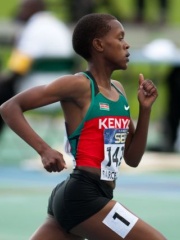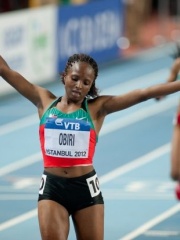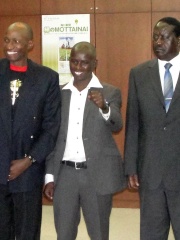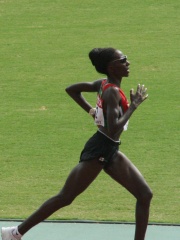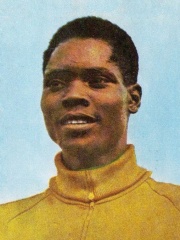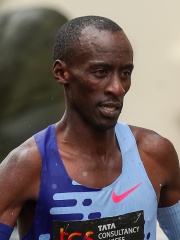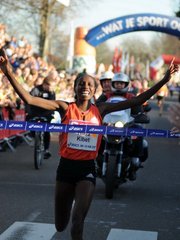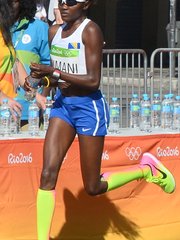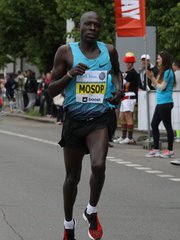
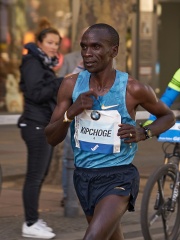
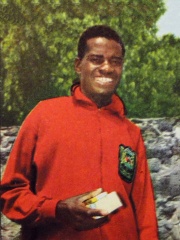
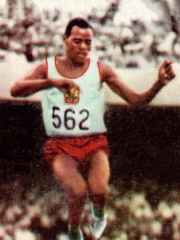

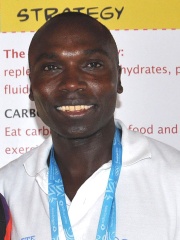
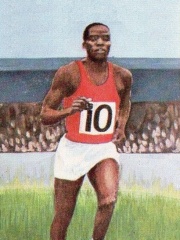

The Most Famous
ATHLETES from Kenya
Top 10
The following people are considered by Pantheon to be the top 10 most legendary Kenyan Athletes of all time. This list of famous Kenyan Athletes is sorted by HPI (Historical Popularity Index), a metric that aggregates information on a biography's online popularity. Visit the rankings page to view the entire list of Kenyan Athletes.

1. Kipchoge Keino (b. 1940)
With an HPI of 61.58, Kipchoge Keino is the most famous Kenyan Athlete. His biography has been translated into 41 different languages on wikipedia.
Kipchoge Hezekiah Keino is a retired Kenyan track and field athlete. He was the chairman of the Kenyan Olympic Committee (KOC) until 29 September 2017. A two-time Olympic gold medalist, Keino was among the first in a long line of successful middle and long distance runners to come from the country and has helped and inspired many of his countrymen and women to become the athletics force that they are today. In 2000, he became an honorary member of the International Olympic Committee (IOC). In 2012, he was one of 24 athletes inducted as inaugural members of the IAAF Hall of Fame.

2. Eliud Kipchoge (b. 1984)
With an HPI of 58.08, Eliud Kipchoge is the 2nd most famous Kenyan Athlete. His biography has been translated into 50 different languages.
Eliud Kipchoge (born 5 November 1984) is a Kenyan long-distance runner who competes in the marathon and formerly specialized in the 5000 metres. Kipchoge is the 2016 and 2020 Olympic marathon champion, and was the world record holder in the marathon from 2018 to 2023, until that record was broken by Kelvin Kiptum at the 2023 Chicago Marathon. Kipchoge has run 4 of the 10 fastest marathons in history, and is widely considered to be one of the greatest marathon runners of all time. Kipchoge claimed his first individual world championship title in 2003 by winning the junior race at the World Cross Country Championships and setting a world junior record for the 5000 m. At the age of eighteen, he became the senior 5000 m world champion at the 2003 World Championships with a championship record, then followed by an Olympic bronze for Kenya in 2004 and a bronze at the 2006 World Indoor Championships. A five-time World Championship 5000 m finalist, Kipchoge took silver medals at the 2007 World Championships, 2008 Beijing Olympics, and 2010 Commonwealth Games. He switched to road running in 2012 and made the second-fastest half marathon debut ever, at 59:25. In his marathon debut, he won the 2013 Hamburg Marathon in a course record time. His first victory at a World Marathon Major came at the Chicago Marathon in 2014, and he went on to become series champion a record five times – for 2016, 2017, 2018, 2019 and 2022. He has won the London Marathon a record four times and also holds the record for most Berlin Marathon wins with five, his latest coming in September 2023. With 15 victories in his first 18 marathons from 2013 to 2023, Kipchoge's only losses were a second-place finish behind Wilson Kipsang Kiprotich at the 2013 Berlin Marathon, where Kipsang broke the world record, an eighth-place finish at the 2020 London Marathon and a sixth place in his debut at the Boston Marathon in 2023. He has since 2024, been defeated in his last three marathons. Kipchoge's last world record run broke by 30 seconds his own 2018 world record, which was in turn a 78-second improvement over the existing best, the greatest improvement in a marathon world record time since 1967. On 12 October 2019, Kipchoge ran the marathon distance for the Ineos 1:59 Challenge in Vienna, achieving a time of 1:59:40.2, becoming the first person in recorded history to do a sub-two-hour marathon. The run did not count as a new marathon record, as he ran with specialized shoes, standard competition rules for pacing and fluids were not followed, and it was not an open event. Kipchoge was appointed Elder of the Order of the Golden Heart by former Kenyan President Uhuru Kenyatta on 20 October 2019 in recognition of his sub-two-hour marathon. He was also named the 2019 BBC World Sport Star of the Year. In 2023 he was awarded the Princess of Asturias Award in the category "Sports".

3. Naftali Temu (1945 - 2003)
With an HPI of 57.90, Naftali Temu is the 3rd most famous Kenyan Athlete. His biography has been translated into 23 different languages.
Nabiba Naftali Temu (20 April 1945 – 10 March 2003) was a Kenyan long-distance runner. He became Kenya's first gold medalist when he won the 10,000 metres race at the 1968 Summer Olympics in Mexico City.

4. Amos Biwott (b. 1947)
With an HPI of 57.52, Amos Biwott is the 4th most famous Kenyan Athlete. His biography has been translated into 21 different languages.
Amos Biwott (born 8 September 1947) is a former Kenyan long-distance runner, winner of the 3000 m steeplechase at the 1968 Summer Olympics. Biwott was the first of a long line of Kenyan runners who starred in the 3000 m steeplechase since Biwott's surprising win at the 1968 Olympics; he pioneered the black Africa's dominance at the long-distance running. Biwott had only three steeplechase races before the Olympics, and his technique was unorthodox. Instead of placing one foot on the barrier and springing off, he cleared the obstacle in one leap, and in this way reduced the clearance time by half. He was the only runner to finish with completely dry feet in both the Olympic qualifying heat and the final, which he won by 0.6 seconds ahead of compatriot Benjamin Kogo. Biwott never won an international championship after the 1968 Olympics. He finished third at the 1970 British Commonwealth Games, was sixth at the 1972 Summer Olympics and completed his career with an eighth place at the 1974 British Commonwealth Games. He then worked for the Kenya Prisons Service until 1978, when he was prosecuted for theft. After that he worked as a watchman at a stadium. Biwott is married to Cherono Maiyo, one of the first Kenyan women to compete at the Summer Olympics. They married in 1973 and have five children.

5. Benjamin Kogo (1944 - 2022)
With an HPI of 56.64, Benjamin Kogo is the 5th most famous Kenyan Athlete. His biography has been translated into 17 different languages.
Benjamin Kogo (30 November 1944 – 20 January 2022) was a Kenyan athlete who specialised in 3000 metre steeplechase running. Kogo was born on 30 November 1944. He was from Arwos, Nandi County, Kenya. He became the first Kenyan to run steeplechase event in Olympics, was a silver medalist from 1968 Summer Olympics, in an event won by his compatriot Amos Biwott. At the 1964 Summer Olympics he failed to make the final at steeplechase. He won gold at the first All-Africa Games held in 1965 in Brazzaville. Kogo was also bronze medalist from the 1966 British Empire and Commonwealth Games. Kogo died on 20 January 2022, at the age of 77. He had been diagnosed with prostate cancer one year prior.

6. Charles Asati (b. 1946)
With an HPI of 55.53, Charles Asati is the 6th most famous Kenyan Athlete. His biography has been translated into 21 different languages.
Charles Asati (born 3 March 1946) is a Kenyan former athlete, winner of a gold medal in 4 × 400 m relay at the 1972 Summer Olympics.

7. Wilson Kipketer (b. 1972)
With an HPI of 55.00, Wilson Kipketer is the 7th most famous Kenyan Athlete. His biography has been translated into 33 different languages.
Wilson Kosgei Kipketer (born 12 December 1972) is a Danish former middle distance runner. With a personal best of 1:41.11, Kipketer is tied with Emmanuel Wanyonyi as the second fastest of all time over the 800 meter distance, behind David Rudisha. Kipketer set the world record and broke his own record two more times, all in 1997. He dominated the 800 m distance for a decade, remaining undefeated for a three-year period and running 8 of the 17 currently all-time fastest times. He won gold medals in three successive editions of the IAAF World Championships in Athletics. Though unable to compete in the 1996 Olympics near the peak of his career, he earned silver in 2000 and bronze in 2004. Kipketer's 800 meters world record stood for almost 13 years. It was surpassed on 22 August 2010, when David Rudisha beat it by 0.02 seconds, running 1:41.09. Kipketer still currently holds the indoor world record for the 800 metres. Kipketer represented both Sparta and KIF during his running career.

8. Wilson Kiprugut (1938 - 2022)
With an HPI of 53.94, Wilson Kiprugut is the 8th most famous Kenyan Athlete. His biography has been translated into 19 different languages.
Wilson Arap Chuma Kiprugut (1938 – 1 November 2022) was a Kenyan sprinter and middle-distance runner. He competed at the 1964 Tokyo and 1968 Mexico Olympics and won two medals in the 800 metres event; in 1964 he also ran 400 metres, but failed to reach the final. He was the first person from Kenya ever to win an Olympic medal. At the 1962 Commonwealth Games, Kiprugut was part of the Kenyan 4 × 440 yards relay team which finished fifth. At the 1966 Commonwealth Games, he won the 880 yards silver medal. He won two gold medals (in the 400 and 800 metres) at the inaugural All-Africa Games in 1965. In 2010, he won the Kenyan Sports Personality of the Year award. Kiprugut grew up in Kericho and began running as a child while at Kaptebeswet Primary School and Sitotwet Intermediate School. His talent was first identified when he ran at the East and Central African Championships – an event where he won no less than three 880-yard titles. Kiprugut died on 1 November 2022, at the age of 84.

9. Philip Waruinge (1945 - 2022)
With an HPI of 53.56, Philip Waruinge is the 9th most famous Kenyan Athlete. His biography has been translated into 16 different languages.
Philip Waruinge (3 February 1945 – 19 October 2022) was a Kenyan professional boxer, who competed in the featherweight division (– 57 kg) during his career as an amateur.
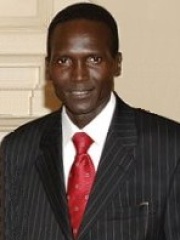
10. Paul Tergat (b. 1969)
With an HPI of 53.18, Paul Tergat is the 10th most famous Kenyan Athlete. His biography has been translated into 27 different languages.
Paul Kibii Tergat (born 17 June 1969) is a Kenyan former professional long-distance runner. He became the first Kenyan man to set the world record in the marathon in 2003, with a time of 2:04:55, and is regarded as one of the most accomplished long-distance runners of all time. Runnerworld called him the "Most comprehensive runner of all time". Towards the end of his career, he concentrated exclusively on the marathon. Tergat set several world records and won many titles on the track, in cross country, and on the road. He lives and trains in Eldoret, Kenya.
People
Pantheon has 199 people classified as Kenyan athletes born between 1938 and 2004. Of these 199, 177 (88.94%) of them are still alive today. The most famous living Kenyan athletes include Kipchoge Keino, Eliud Kipchoge, and Amos Biwott. The most famous deceased Kenyan athletes include Naftali Temu, Benjamin Kogo, and Wilson Kiprugut. As of April 2024, 27 new Kenyan athletes have been added to Pantheon including Lucas Sang, Kipkemboi Kimeli, and Nixon Kiprotich.
Living Kenyan Athletes
Go to all RankingsKipchoge Keino
1940 - Present
HPI: 61.58
Eliud Kipchoge
1984 - Present
HPI: 58.08
Amos Biwott
1947 - Present
HPI: 57.52
Charles Asati
1946 - Present
HPI: 55.53
Wilson Kipketer
1972 - Present
HPI: 55.00
Paul Tergat
1969 - Present
HPI: 53.18
Faith Kipyegon
1994 - Present
HPI: 52.14
William Tanui
1964 - Present
HPI: 50.49
Hellen Obiri
1989 - Present
HPI: 50.05
Douglas Wakiihuri
1963 - Present
HPI: 49.11
Catherine Ndereba
1972 - Present
HPI: 49.03
Moses Kiptanui
1970 - Present
HPI: 48.99
Deceased Kenyan Athletes
Go to all RankingsNaftali Temu
1945 - 2003
HPI: 57.90
Benjamin Kogo
1944 - 2022
HPI: 56.64
Wilson Kiprugut
1938 - 2022
HPI: 53.94
Philip Waruinge
1945 - 2022
HPI: 53.56
Julius Sang
1946 - 2004
HPI: 53.13
Naftali Bon
1945 - 2018
HPI: 52.55
Munyoro Nyamau
1942 - 2025
HPI: 52.33
Ben Jipcho
1943 - 2020
HPI: 51.52
Kelvin Kiptum
1999 - 2024
HPI: 50.31
Daniel Rudisha
1945 - 2019
HPI: 49.95
Paul Kipkoech
1963 - 1995
HPI: 47.97
Robert Wangila
1967 - 1994
HPI: 47.83
Newly Added Kenyan Athletes (2025)
Go to all RankingsLucas Sang
1961 - 2007
HPI: 47.52
Kipkemboi Kimeli
1966 - 2010
HPI: 46.35
Nixon Kiprotich
1962 - Present
HPI: 43.76
Stephen Kipkorir
1970 - 2008
HPI: 42.25
William Mutwol
1967 - Present
HPI: 40.07
Bernard Barmasai
1974 - Present
HPI: 38.95
Hilda Kibet
1981 - Present
HPI: 38.34
Lucia Kimani
1981 - Present
HPI: 36.61
Vincent Kipruto
1987 - Present
HPI: 36.38
Augustine Kiprono Choge
1987 - Present
HPI: 36.28
Moses Mosop
1985 - Present
HPI: 35.94
Rebecca Cheptegei
1991 - 2024
HPI: 35.82
Overlapping Lives
Which Athletes were alive at the same time? This visualization shows the lifespans of the 20 most globally memorable Athletes since 1700.

